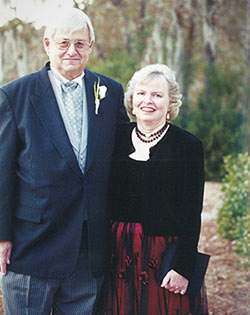Taking control… A difficult thing to do once you and your family face pancreatic cancer. A disease with only a 9 percent survival rate not only steals time but also a sense of control.
Pancreatic cancer stole both from Janet and Daniel Mordecai and their four children. Daniel died from pancreatic cancer in 2002 — his mother had already passed from the disease years before.

Daniel and Janet Mordecai.
Despite this horrible loss, the surviving members of the Mordecai family refused to surrender. After her husband’s death, Janet took the proceeds from the sale of her husband’s business and created the Daniel and Janet Mordecai Foundation. She then gave each of the Mordecai children a task. “I decided to let them figure out which charities they wanted to fund. After doing all of the legwork, they decided to give a single large donation to the Pancreatic Cancer Action Network. They were interested in funding research, especially the genetics of a disease that took their father and grandmother.”
Research: figuring out how pancreatic cancer works and how to fight it. The ultimate battle for control.
With a landmark gift of $1.4 million, the family established the Daniel and Janet Mordecai AACR Career Development Award as well as a Pathway to Leadership Award. Since then, the Mordecai Foundation has funded six scientists who are committed to advancing pancreatic research.
“This award made it possible for me to begin a laboratory-based research career in the midst of record low federal funding rates,” says Oliver McDonald, MD, PhD. “I will always be grateful to [the Mordecai] Foundation. In fact, it is very unlikely that I would have studied pancreatic cancer at all without this award.” McDonald, MD, PhD, recently published an exciting and important study in Nature Genetics, which describes how cellular metabolism (breakdown of food/nutrients for energy) impacts epigenetic changes that cause pancreatic cancer cells to spread throughout the body.
In fact, Dr. McDonald forged a collaboration with another early-career PanCAN grantee, Katy Wellen, PhD, from University of Pennsylvania. Oliver and Katy met at PanCAN’s Annual Scientific Meeting years ago, and Katy has brought much-needed expertise about cancer cell metabolism to McDonald’s studies — and she’s a coauthor on the paper. This partnership would not have been made possible without support from the Mordecai Foundation.
“Giving was always a part of my life,” Janet says. “While growing up, my family and I would visit orphanages, bringing boxes of food. And because my parents were musicians, we’d sing for them, too. We didn’t have a lot of money, but giving what we had was important to us.”
By honoring Daniel Mordecai’s memory, the Mordecai Foundation has also helped transform the landscape of pancreatic cancer research. From 2003-2016, the Pancreatic Cancer Action Network has awarded 142 grants to 143 scientists at 55 institutions. This year, PanCAN will invest $12.8 million in innovative research — funds that generous philanthropists like the Mordecai family help to provide.
Today, giving remains an important value to the Mordecai family. “You give because you can,” Janet says. “Anything that you can do that makes a person’ life better feels good. I’ve had some wonderful surprises along the way. Things I didn’t expect, and so it’s been a wonderful journey to give back.”
















